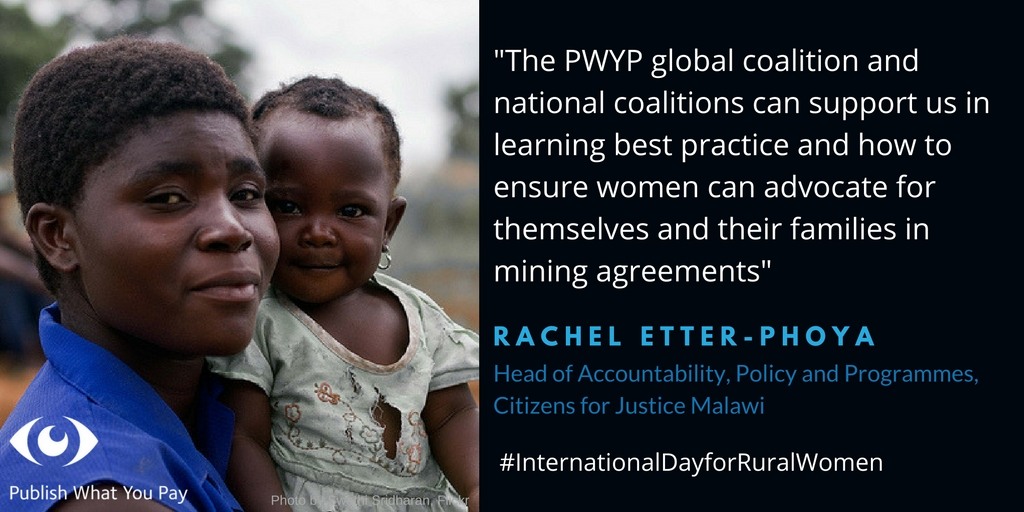The villagers of Mwabulambo in northern Malawi first heard about the arrival of a mining company in their area when large trucks came rolling into their dusty rural village. This unexpected arrival was the first news they received about a mining company coming to dig for coal on their land.
The rural women in the area hoped that this development would bring job opportunities and a much-needed healthcare centre to the area for their families. Yet in the space of half a year, these rural communities were uprooted by mining activities they had been completely unaware of. None of the villagers had been consulted about these changes and no consent had been given.
Because of Malawi’s significant mineral wealth, the government has actively promoted private investments in mining and resource extraction, trying to diversify its economy away from agriculture, in particular tobacco. A large number of licenses were issued all around the country, allowing oil and gas extraction to take place in areas around Lake Malawi, including protected UNESCO World Heritage sites.
Even Malawi’s newest draft law, the relatively-progressive Mines and Minerals Bill, exposes a significant administrative loophole: the lack of transparency about the mining-related risks. This means that local communities’ right to access information, obtain respectful resettlement agreements, and be informed about the benefits and risks of existing and future problems aren’t officially enforced.
“We need to support coalitions in helping women involved in mining, residing in mining communities or working in civil society to conduct their own research in the space they occupy and communicate their own stories using different media. Malawi is introducing a new Mines and Minerals Act which will include Community Development Agreements,” explains Rachel Etter-Phoya, Head of Accountability, Policy and Programmes at Citizens for Justice Malawi.
“This is an improvement of the 1981 Act that places minimal requirements on companies to engage with nearby communities. The PWYP Global Coalition and national coalitions can support us in learning best practice and how to ensure particularly women can advocate for themselves and their families in these agreements.”
“The PWYP Global Coalition and national coalitions can support us in learning best practice and how to ensure particularly women can advocate for themselves and their families in these agreements”
When mining has negative consequences like in Mwabulambo, rural women are disproportionately affected. Despite Malawi’s Constitution recognising women’s right to equal protection and non-discrimination, they are still affected by the socio-cultural gender biases and attitudes. This is a recurring theme found in many countries where PWYP members are based.
As a rural woman in a remote community, access to information about mining activities is a huge challenge. Their participation in community meetings about extractive activities is extremely limited; women are often excluded because of their educational abilities and strenuous daily schedules.
“Artisanal and small-scale mining provides an opportunity for much needed non-farm income and women make up the majority engaged in this sector. There has been some limited support for technical training and for establishing cooperative, but more work needs to be done in this regard,” says Rachel.
Communities like Mwabulambo are ingrained with patriarchal systems which give more decision-making power about land use to men. If this balance was equally shared with the women who most often work with the land, risks could be diminished as a family-first approach would be prioritised.
“Most of the land in the project impact areas is owned by men who mostly are the head of the households. However, in most instances, it is the woman who benefits directly from the physical resources like land and other natural resources,” says Cynthia Simkonda, Programme Officer at the Centre for Environmental Policy and Advocacy.
“But when mining operations start, they are the most affected as they would have to walk longer distances to collect firewood and other livelihood necessities due to displacement and pollution of river systems.”
In order to solve the issues rural women face from extractive activities, impacts on their livelihoods and social environments must be monitored and addressed. It is vital to ensure that free, prior and informed consent is prioritised above anything else to protect communities from these potentially harmful situations.
Paying special attention to rural women and the impacts mining has on their daily lives is the key to protecting villagers from losing their land, water supplies, and sustainable futures. Giving families the compensation they deserve is another important factor which would allow communities to relocate and rebuild in a safe environment.
It is crucial that rural women are empowering to work in small-scale mining because it can transform their skills into well-being and sustainable development. By empowering women, this in turn empowers communities to make the most of male and female workers.
Ultimately, governments must adopt a community-centric approach to dealing with how women should be integrated into decision-making processes and ensure they are protected against exploitative developments by extractive companies.
